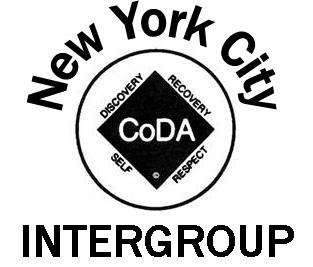 |
A Twelve Step self-help program for Co-Dependents |
| Click on a Step below to see the readings and exercises for that Step. Step 1 Step 2 Step 3 Step 4 Step 5 Step 6 Step 7 Step 8 Step 9 Step 10 Step 11 Step 12 |
CoDependents Anonymous (CoDA) in New York City This web site has been provided by NYC CoDA Intergroup Working the 12 Steps of CoDependents Anonymous (CoDA) © 2005 NYC CoDA Intergroup. All rights reserved. The CoDA 12 Steps and 12 Promises are © Co-Dependents Anonymous, Inc. The Twelve Steps and Twelve Traditions have been reprinted and adapted with permission of Alcoholics Anonymous World Services, Inc. Permission to reprint and adapt this material does not mean that AA has reviewed or approved the content of this publication, nor that AA agrees with the views expressed herein. AA is a program of recovery from alcoholism only – use of the Twelve Steps and Twelve Traditions in connection with programs and activities which are patterned after AA, but which address other problems, does not imply otherwise. Step 8 Co-Dependents Anonymous Step 8: “Made a list of all persons we had harmed and became willing to make amends to them all.” Co-Dependents Anonymous Promise 8: “I learn that it is possible for me to mend – to become more loving, intimate, and supportive. I have the choice of communicating with my family in a way which is safe for me and respectful of them.” Suggested Reading CoDA Blue Book pp. 56-60. 12 Step Handbook: Step 8 Chapter, pages 35-38. “CoDA 12 Steps & 12 Traditions Workbook – Steps 7,8,9” : Step 8 is pages 17-19. Exercises These exercises can help you work the 8th Step. In other words, they allow you to get into the feelings and specifics and not just rush through the Step. Keep the task manageable; set safe boundaries for yourself. For example, set aside an amount of time that feels comfortable to you to work the Step at a given time. Keep it simple. Consider “book-ending” with your Step work. Book-ending means telling someone, or your meeting, that you plan to do something, then telling them afterwards that you did it. It can help you show up for yourself. Finally, be gentle, and remember that reading and writing about a Step are an important part of working the Steps. 1. Without editing or over-analyzing, write about “what the 8th Step means to me.” 2. Review the questions on page 37 of the 12 Step Handbook and on page 19 of the “CoDA 12 Steps & 12 Traditions Workbook – Steps 7,8,9”. Use any that feel right. 3. Exercise – Making your list: review your 4th Step inventory, looking for people you’ve harmed, including yourself. Place those people on your list. Are there others who belong on the list? Take your time. 4. Are there people you’re reluctant to include on your list? Why? Do you believe they’ve harmed you more than you’ve harmed them? Does it help your recovery to compare in this way, figuring our who’s “more to blame”? Can you acknowledge your part, however small it may seem, without shaming yourself? 5. Is there an energy you bring into the world (victim, perfect…) that causes harm to you and others? 6. Exercise: Review the list of codependent characteristics in the CoDA Book, pages 42-43. Write names of people next to each trait. For example, next to judging you might write “mom, Joe, and brother David.” Next to withholding you might write “Sally (my ex)”, etc. 7. Do you tend to harm people in more active or passive ways? Active ways might include raging, shaming and controlling. Passive ways might include withholding (of time, attention, or love), resenting, avoiding, or keeping secrets. Is one “style” of harming people better or worse than the other? Does it count as harm if it can’t be seen? 8. Why is it important to put yourself on the list? How will making amends to yourself help you make amends to others? 9. Can you look at your part in each dysfunctional relationship, however small your part may have been? Do fear, pride, or the need to be right keep you from acknowledging the part you play in your relationships? How does it harm you when you don’t acknowledge your part in a relationship? 10. Exercise – Becoming willing to make amends: Look at the people on your list, including yourself. For each person, consider these two questions: (1) What will your life be like if you make amends and change your behavior? (2) What will be the cost, to you and the relationship, if you never change your behavior in any way? (For example “more years of resenting will weigh me down and distract me from my life and it will keep from having a true relationship with this person…”) Remember, focus on the willingness to make amends, not on what the amends will be; that will come in Step 9. 11. What Tools of recovery might help you become willing to make amends? 12. How is the 8th Step related to the 8th Promise? If you want to be on our email list to receive updates on upcoming CoDA events in New York City, please write to anicko2794@yahoo.com For more CoDA info, go to www.codependentsnyc.org or call 646-289-9954 For more information on the program of CoDependents Anonymous, visit the CoDA World Fellowship web site at www.coda.org |